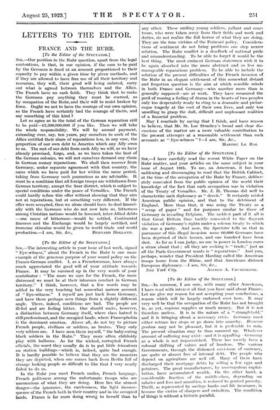LETTERS TO THE EDITOR.
FRANCE AND THE RUHR.
[To The Editor of the SPECTATOR.]
Sia,—Our position in the Ruhr question, apart from the legal contentions, is that, in our opinion, if the sum to be paid by the Germans is fixed at an amount proportioned to their capacity to pay within a given time by given methods, and if they are allowed to have free use of all their territory and resources, they will, their good will being enlisted, carry out what is agreed between themselves and the Allies. The French have no such faith. They think that to make the Germans pay anything they must be coerced, as by occupation of the Ruhr, and their will to resist broken by force. Ought we not to have the courage of our own opinion, as the French have certainly had the courage of theirs, and say something of this kind ?
Let us agree as to the total of the German reparation still to be paid-12,500,000,000 if you like. Then we will take the whole responsibility. We will by annual payment, extending over, say, ten years, pay ourselves to each of the Allies entitled their share of reparations less, in any case, the proportion of our own debt to America which any Ally owes to us. The rest of our debt from each Ally we will, as we have already promised, forgo, and, as we have taken the best of the German colonies, we will not ourselves demand any share in German money reparations. We shall then recover from Germany, under separate agreement with that country, the sums which we have paid for her within the same period, taking from Germany such guarantees as are advisable. It must be a condition that all foreign troops are withdrawn from German territory, except the Saar district, which is subject to special conditions under the peace of Versailles. The French could hardly refuse this offer without showing that they aim not at reparations, but at something very different. If tlie offer were accepted, then we alone should have to deal financi- ally with the Germans who do not now hate us, bitterness among Christian nations would be lessened, inter-Allied debts —one cause of bitterness—would be settled, Continental finances and the Exchange would be largely rectified, and immense stimulus would be given to world trade and world


































 Previous page
Previous page